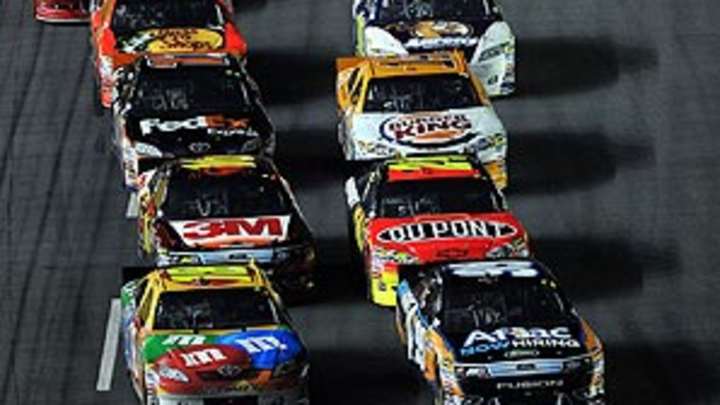A bold proposal to drastically improve NASCAR's All-Star Race


They've changed the rules for the All-Star Race year after year. They even altered them midway through the race once.
Now, NASCAR and Sprint should make their boldest change -- a twist unlike any in sports. They should make the winner choose either the $1 million prize or a spot in the Chase.
But, of course, there would be a catch.
If the driver takes the spot in the Chase -- becoming the 13th competitor vying for the crown -- then he wouldn't receive bonus points for any victories before the Chase. The $1 million then would go to charity. Given that Tony Stewart's check for last year's title was $5.8 million, turning down the $1 million doesn't seem so bad.
Or the driver can take the money and try to earn his way into the Chase.
Remember that last year's championship was settled by a tiebreaker. Think how valuable those victory bonus points can be.
Now, not everyone will be on board with this idea:
Letting a driver make the Chase off one race cheapens the regular season! This isn't fair since not everyone drives in the All-Star Race! Why change something for the sake of change? Why? Why? Why?
Why do this?
This race features the best of the best, yet how often do you hear teams talk about using this as a test session for the next week's Coca-Cola 600? Fans aren't paying test-session prices, along with everything else, so they don't deserve that type of racing.
Yes, the All-Star Race can be fun, and drivers like the idea of not racing for points. Certainly, it has had its fireworks, but not every year comes close to the hype. This move could help.
Making a Chase spot available to the winner could change strategies and possibly add more excitement throughout the event. Officials have tried for years, through a variety of rule changes, to add drama to those early segments. This year features yet another new format.
Just think what a Chase option could do for some drivers, such as Jeff Gordon, whose only chance of making the Chase looks to be via the wild card, or Mark Martin, who likely won't be eligible for a wild-card spot because he'll miss too many races.
Think about the dilemma James Finch or the Wood Brothers would face if Kurt Busch or Trevor Bayne won the race. Would they take the $1 million or would they take the Chase spot and hope that would lead to more sponsorship?
The decision could be just as difficult for others. Since the Chase's debut in 2004, three All-Star winners were just inside the top 10 at the time of their victory. Kurt Busch was ninth in the standings when he won in 2010. Kevin Harvick was eighth in 2007. Mark Martin was 10th in 2005. Imagine the drama and then the debate on what a driver in a similar situation should do.
Gimmicky? You bet. But so is this event. Drivers are introduced with their pit crews. This is where double-file restarts with the lead-lap cars at the front originated -- the same restart style used in all the other Cup races now. The race is shorter than any other event and once had a 10-minute break -- and a concert -- before the final segment.
Just because it's a unique event doesn't mean the winner shouldn't automatically qualify for the Chase, though.
For those who argue this would make the 26-race "regular season'' meaningless, you're wrong. The other 12 drivers still have to earn their way into the event.
Even the All-Star winner had to earn his way into the event by winning a race within the last year, being a former All-Star winner or series champion within the past 10 years, finishing in the top two in the Sprint Open -- the undercard to this title bout of racing -- or winning the fan vote.
Since the Chase began in 2004, every All-Star winner except one -- Kasey Kahne in 2008 -- has made the Chase. He made the All-Star race via the fan vote. Even though some would argue he got a free pass into the All-Star Race, he started at the rear and still won the event.
As it turned out, he wouldn't have been a factor even if he had made the Chase that year, as he finished in the top 10 only twice during the NASCAR playoff. Still, if he had been a factor, he would have become a Cinderella, and sport fans love the underdog.
Of course, a similar method has worked in other sports and there seem to be few complaints.
Connecticut won the 2010-11 NCAA men's basketball championship after finishing ninth in its conference during the regular season. UConn only made the NCAA tournament after winning five games in five days in the Big East tournament. So, one could argue that Connecticut's regular season mattered little. Five days trumped what that team had done the previous four months.
Yet no one called the Huskies an unworthy tournament team. Instead, they became Cinderella and were embraced when they won the national title.
This summer features the Olympics, the ultimate one-and-done event. Many will make their team based on how they did in one trial. If they make the Games, the gold medals will be based on how those athletes perform in one singular event. Is that fair? Maybe not, but that's the way it is and no one has changed the Olympics to give athletes an extra chance.
Right or wrong, sports are about entertainment and drama. What's wrong with one night being a bit different from the others? Nothing. So, NASCAR and Sprint should consider this and for one night a year give fans something different and give drivers and teams a decision that could be worth millions of dollars. Or cost them millions.
Wouldn't that be something?
